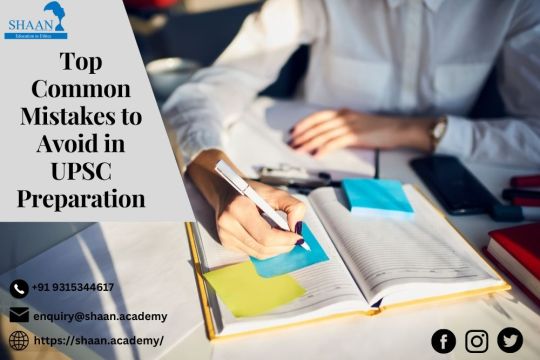#common mistakes in upsc preparation
Text
Negative Habits to Avoid for UPSC Preparation
Imagine preparing for the UPSC exam is like setting off on a thrilling adventure. But just like any adventure, there are challenges to overcome. It takes a lot of hard work, sticking to your goals, and having a good plan. But, sometimes, even if you're really trying your best, you might find yourself doing things that could make it harder for you to succeed. In this guide, we'll explore common negative habits faced by UPSC aspirants and provide straightforward solutions to overcome them. By implementing these simple strategies, aspirants can navigate through challenges effectively and achieve success in their UPSC journey.
Procrastination - Putting Off Tasks

Procrastination is when we delay tasks or waste time on unimportant things. Many UPSC aspirants struggle with procrastination, which can lead to missed study sessions and last-minute pressure.
To overcome procrastination, break your study tasks into smaller, manageable parts. To create a sense of urgency, establish particular deadlines for every task. By taking small steps consistently, you can avoid procrastination and stay on track with your study schedule.
“You may delay, but time will not.”
― Benjamin Franklin
There are always distractions, if you allow them! Successful people remain optimistic and concentrated on their goals regardless of their surroundings. They stay focused. They avoid getting distracted, which is common in today's digital world. Social media, notifications, and other distractions can easily divert our attention away from studying.
To avoid distractions, create a dedicated study space that is free from potential distractions. Turn off notifications on your phone and use productivity tools to block distracting websites. Set specific times for studying and avoid multitasking. By minimizing distractions, you can improve focus and productivity during your study sessions.
Distractions - Losing Focus

“Work is hard. Distractions are plentiful. And time is short.”
― Adam Hochschild
Lack of Consistency

Consistency is really important for doing well in UPSC preparation. It’s key to success. However, many aspirants struggle to maintain a consistent study routine.
To overcome this, establish a daily study schedule and stick to it religiously. Make sure you stick to your study schedule and give it more importance than other things. Set realistic goals for each study session and keep checking how well you're doing. By making studying a habit and sticking to a consistent routine, you can maximize your productivity and progress in your UPSC preparation.
“Success isn't always about greatness. It's about consistency.
Consistent hard work leads to success. Greatness will come.”
― Dwayne Johnson
Neglecting Health and Adequate Sleep

UPSC preparation can be mentally and physically demanding, and many aspirants neglect their health in pursuit of their goals. However, neglecting your health can have negative consequences on your ability to study effectively. Sleep is essential for cognitive function, memory retention, and overall well-being. However, many aspirants neglect their sleep in favor of studying late into the night. This can lead to sleep deprivation, which can impair your ability to focus, concentrate, and retain information.
To prioritize your health, make sure to get an adequate amount of sleep each night. Aim for at least 7-8 hours of sleep to ensure that your mind and body are well-rested. In addition, make time for regular exercise and physical activity to reduce stress and improve overall well-being. Finally, don't forget to eat a balanced diet and stay hydrated to fuel your body and brain for studying.
Relying on One Study Method

Every aspirant has their own preferred study method, whether it's reading, taking notes, or practicing past papers. However, relying solely on one study method can limit your learning and comprehension.
To overcome this, try diversifying your study methods to engage different parts of your brain. For example, if you're used to reading, try incorporating more visual aids or discussing concepts with peers. Try out various methods of studying until you discover which one suits you the most. By diversifying your study methods, you can improve your understanding and retention of the material.
Negative self-talk can be dangerous to your confidence and motivation. Many aspirants struggle with self-doubt and fear of failure, which can hold them back from reaching their full potential.
To overcome negative self-talk, practice self-compassion and positive affirmations. Instead of focusing on your shortcomings, celebrate your achievements and strengths. Be around friends and family who support you and have faith in your skills. By cultivating a positive mindset and practicing self-love, you can overcome self-doubt and achieve success in your UPSC journey.
Negative Self-Talk - Self-Doubt

"One important key to success is self-confidence.
An important key to self-confidence is preparation."
― Arthur Ashe
Trying to Read Everything

UPSC aspirants are often overwhelmed by the sheer volume of reading material available. Many aspirants feel pressured to read every book and resource on a given topic, leading to stress and burnout.
To overcome this, focus on quality over quantity when it comes to reading. Prioritize essential books and resources that cover the core concepts and topics of the UPSC syllabus. Take notes as you read to help reinforce your understanding and retention of the material. Remember, it's better to thoroughly understand a few key concepts than to skim/go through numerous resources without grasping the core concepts.
Disorganization can hinder your ability to study effectively and efficiently. Many aspirants struggle to keep track of study materials, deadlines, and important dates.
To overcome this, create a study schedule and organize your study materials in a systematic manner. Use folders, binders, or digital tools to keep your study materials organized and easily accessible. Break down your study schedule into smaller, manageable tasks and set deadlines for each task. By staying organized, you can reduce stress and improve productivity in your UPSC preparation.
Lack of Organization

“For every minute spent organizing, an hour is earned.”
― Benjamin Franklin
Misplaced Study Groups

Study groups can be a valuable resource for UPSC aspirants, providing support, motivation, and shared knowledge. However, not all study groups are created equal, and some aspirants may find themselves in study groups that are not conducive to effective studying.
To overcome this, choose study partners wisely and find individuals who are serious and committed to their UPSC goals. Look for study groups or forums where you can engage with like-minded aspirants who share your dedication and enthusiasm for UPSC preparation. By surrounding yourself with supportive and motivated study partners, you can enhance your learning and stay on track with your UPSC goals.
Overcoming negative habits is essential for UPSC aspirants to succeed in their journey. By implementing simple strategies such as breaking tasks into smaller parts, minimizing distractions, maintaining consistency, prioritizing health, diversifying learning methods, fostering a positive mindset, finding a balance between work and study, focusing on quality reading, staying organized, choosing study partners wisely, using the internet judiciously, and prioritizing sleep, aspirants can navigate through challenges effectively and achieve success in their UPSC preparation. Remember, success in the UPSC examination requires dedication, perseverance, and a willingness to overcome obstacles. Keep pushing forward, stay focused on your goals, and believe in yourself—victory is within reach!
#upsc#education#upsc2024#upscpreparation#upscstudymaterial#quotes for upsc aspirants#quotes for students motivation#Misplaced Study Groups in UPSC Preparation#Lack of Organization in UPSC Preparation#Trying to Read Everything in UPSC Preparation#Negative Self-Talk - Self-Doubt#Relying on One Study Method#Neglecting Health and Adequate Sleep in upsc preparation#Lack of Consistency in upsc preparation#Distractions in upsc preparation#procrastination in upsc preparation#Procrastination#upsc syllabus ignorance#upsc exam strategy mistakes#ENSURE IAS coaching tips#upsc self-study bad habits#upsc time management mistakes#ENSURE IAS academy tips#upsc coaching center habits to avoid#upsc study routine mistakes#UPSC#bad habits for upsc exam#common mistakes in upsc preparation#ENSURE IAS preparation tips#negative habits for upsc aspirants
2 notes
·
View notes
Text
4 Common Mistakes to Avoid During Your IAS Mock Interview

Preparing for the IAS mock interview can be a nerve-wracking experience for many aspirants. It is a crucial step towards achieving your dream of becoming a civil servant. The mock interview is designed to simulate the real IAS interview and help you identify your strengths and weaknesses. However, many candidates make common mistakes during their IAS mock interview preparation, which can hinder their chances of success. In this blog post, we will discuss five common mistakes that you should avoid during your IAS mock interview.
1) Not researching about the panel members:
One of the most common mistakes that candidates make is not researching about the panel members who will be conducting the mock interview. It is essential to know their background, their areas of expertise, and their style of questioning. This will help you prepare better and understand what they expect from you. You can also try to find out if any of the panel members have a particular interest in your chosen subject or any other relevant information that can give you an edge during the interview.
Also Read: Best UPSC Online Coaching
2) Not practicing enough:
Practice makes perfect, and this holds true for the IAS mock interview as well. Many candidates do not dedicate enough time to practice and end up feeling nervous and unprepared on the day of the interview. It is crucial to simulate the interview environment and practice answering questions confidently and concisely. You can also seek feedback from your mentors or peers to improve your performance.
3) Focusing only on current affairs:
While current affairs are an essential aspect of the IAS interview, focusing only on them can be a grave mistake. The panel members are looking for well-rounded individuals with a broad understanding of various subjects. It is crucial to have a basic knowledge of history, geography, economics, and other relevant topics. Neglecting these subjects can make you appear one-dimensional and may not leave a good impression on the panel.
Also Read: UPSC Previous Year Papers
4) Not being aware of your body language:
Your body language can speak volumes about your confidence and personality. Many candidates overlook the importance of body language and end up making mistakes like fidgeting, not maintaining eye contact, or slouching. It is crucial to practice maintaining a confident posture, using hand gestures appropriately, and maintaining a friendly and approachable demeanor. These small details can make a significant impact on the panel members.
Also Read: MPPC Result
0 notes
Text
Common Mistakes to Avoid in UPSC Preparation
Navigate the UPSC preparation journey with confidence by steering clear of common pitfalls. Learn essential strategies and insights to avoid typical mistakes that aspirants often make, ensuring a more efficient and effective study approach. Maximize your chances of success with expert guidance tailored to the demands of the UPSC examination.
Visit us at - UPSC Classes in Delhi
0 notes
Text
How much current affairs for UPSC

Introduction
Aspirants preparing for the UPSC exam often wonder about the ideal amount of current affairs they should cover. In this comprehensive guide, we delve into the significance of UPSC current affairs preparation, strategies for staying updated, and common mistakes to avoid.
Importance of Current Affairs
Current affairs form the bedrock of the UPSC exam, encompassing diverse topics ranging from national and international events to socio-economic developments. Understanding current affairs not only enriches knowledge but also fosters critical thinking and analytical skills essential for the exam.
Understanding the UPSC Exam
The UPSC exam is renowned for its rigorous selection process, comprising three stages: prelims, mains, and the interview. Current affairs play a pivotal role across all stages, serving as a determining factor in the selection process.
Duration of Current Affairs Preparation
One common query among UPSC aspirants is the amount of current affairs they should cover. While there's no definitive answer, a comprehensive approach typically involves staying updated with current affairs from the past 1-2 years leading up to the exam.
Effective Strategies for Current Affairs Preparation
Mastering current affairs necessitates a structured approach and strategic planning. Engage in daily newspaper reading, follow reputable news websites, and make use of digital platforms offering curated current affairs content.
Incorporating Current Affairs in Study Routine
Integrating current affairs study into your daily routine is essential for consistency. Allocate dedicated time slots for current affairs review, ensuring regular updates on recent events and developments.
Resources for Current Affairs Preparation
Accessing reliable sources is paramount for effective current affairs preparation. Trusted newspapers like The Hindu, websites such as PIB (Press Information Bureau), and UPSC-specific magazines offer valuable insights and analysis.
Analyzing Previous Year's Questions
Analyzing past UPSC papers provides invaluable insights into the exam pattern and question trends. Focus on understanding the type of questions asked and the areas frequently covered in current affairs.
Role of Current Affairs in Different Stages of UPSC
Current affairs play a distinct role in each stage of the UPSC exam. From the conceptual clarity required in prelims to the depth of analysis in mains and the interview, staying updated is indispensable.
Balancing Current Affairs with Other Subjects
While current affairs hold significant weightage, it's crucial to strike a balance with other subjects. Allocate time proportionally based on the syllabus and prioritize areas of weakness.
Common Mistakes to Avoid in Current Affairs Preparation
Avoid common pitfalls such as relying solely on online sources, neglecting revision, and overlooking international affairs. Maintain a structured approach to ensure comprehensive coverage.
Tracking Progress
Regularly assess your current affairs preparation progress through quizzes, mock tests, and self-assessment.
Conclusion
In conclusion, the optimal amount of current affairs for UPSC preparation depends on various factors such as the exam timeline and individual study habits. By adopting effective strategies, avoiding common pitfalls, and staying updated with reliable sources, aspirants can enhance their preparation and increase their chances of success in the UPSC exam.
This article was originally published by medium.com/@upsccourses. Read the original article here.
youtube
0 notes
Text
The UPSC Prelude: How Prelims Test Series Paves the Way for Success

The journey to conquer the Union Public Service Commission (UPSC) examination, one of India's most challenging and prestigious competitive exams, begins with a critical first step: the Preliminary examination, or Prelims. This stage serves as a gateway to the Mains and eventually, the interview round, making it crucial for aspirants to employ strategic preparation methods. Among these, enrolling in the best test series for UPSC Prelims has emerged as a non-negotiable tool in the arsenal of successful candidates. This article delves into how UPSC Prelims test series are pivotal in paving the path to success, offering insights into their structure, benefits, and strategies for optimal utilization.
The Strategic Edge of UPSC Prelims Test Series
Test series for UPSC Prelims are meticulously designed to mirror the pattern, difficulty level, and scope of the actual exam. By simulating the real exam environment, these test series offer a practical experience that is invaluable for aspirants. Engaging with a high-quality UPSC Prelims test series equips candidates with several strategic advantages.
Familiarity with Exam Pattern and Time Management
One of the primary benefits of participating in the test series is gaining familiarity with the UPSC Prelims exam pattern. It helps aspirants understand the type of questions asked, the distribution of marks, and the critical areas of focus. Moreover, practicing with timed tests improves time management skills, enabling candidates to allocate their time wisely across questions and avoid last-minute rushes that could lead to mistakes.
Identification of Strengths and Weaknesses
Regular participation in a test series for UPSC Prelims helps candidates identify their strong and weak areas within the vast syllabus. This self-awareness allows for targeted improvement, enabling aspirants to focus their preparation on areas that need more attention, thereby optimizing their study strategy.
Boosts Confidence and Reduces Exam Anxiety
The familiarity and comfort developed through consistent practice with test series can significantly boost an aspirant's confidence. It also helps in reducing exam anxiety, a common challenge faced by many. The psychological readiness achieved through repeated exposure to exam-like conditions is invaluable on the actual exam day.
Enhanced Accuracy and Efficiency
The best test series for UPSC Prelims are designed to challenge aspirants, encouraging them to think critically and improve their problem-solving speed. This practice enhances accuracy and efficiency, crucial elements for success given the negative marking scheme in the Prelims.
Real-time Feedback for Continuous Improvement
Many UPSC Prelims test series offer detailed analysis and feedback on performance, providing insights into not just what questions were answered incorrectly, but why. This feedback mechanism allows for continuous learning and improvement, enabling aspirants to refine their strategies, knowledge, and exam-taking skills progressively.
Choosing the Best Test Series for UPSC Prelims
With numerous options available, selecting the best test series for UPSC Prelims requires careful consideration. Look for test series that:
Are created by experienced educators and successful UPSC veterans.
Cover the entire syllabus comprehensively.
Include questions of varying difficulty levels, from basic to advanced.
Provide detailed explanations and feedback for each test.
Offer an online platform for practice to simulate the actual exam environment closely.
Incorporating Test Series into Your Preparation Strategy
To maximize the benefits of UPSC Prelims test series, incorporate them strategically into your study plan. Begin taking tests early in your preparation phase to build a strong foundation and gradually increase the frequency as the exam approaches. Use the feedback from each test to guide your studies and ensure that you revise not just the questions you got wrong but also the ones you got right, to reinforce your knowledge.
Conclusion
The UPSC Prelims examination is a formidable challenge, but one that can be surmounted with diligent preparation and the right tools. Best test series for UPSC Prelims are more than just practice tests; they are a comprehensive preparation tool that offers familiarity with the exam pattern, improves time management, identifies strengths and weaknesses, boosts confidence, and enhances accuracy and efficiency. Choosing the best test series and integrating it into your preparation strategy can significantly pave your way to success in the UPSC journey. As you embark on this challenging yet rewarding path, remember that the key to success lies in consistent practice, continuous learning, and strategic improvement.
0 notes
Text
10 Most Common Mistakes to avoid in UPSC Prelims Preparation

Embarking on the journey to crack the UPSC Prelims can be like placing sail on a widespread ocean of information, wherein the winds of guidance can either propel you ahead or leave you adrift. As you navigate through the waves of syllabi and take a look at materials, it's crucial to be clear of commonplace pitfalls that can sabotage your efforts and jeopardize your achievement. Here, we unveil the 10 most common errors to avoid in UPSC Prelims practice, upsc coaching in vadodara guiding you towards smoother cruising and brighter horizons.
Underestimating the Syllabus: One of the gravest mistakes UPSC aspirants make is underestimating the breadth and intensity of the syllabus. The UPSC Prelims syllabus is expansive, covering a diverse range of topics from history and geography to present day affairs and preferred science. It's critical to acquaint yourself with the syllabus and leave no stone unturned to your coaching.
Ignoring NCERTs and Basic Books: Neglecting the NCERT textbooks and essential reference books is similar to building a house without a stable basis. These books offer the groundwork to your understanding of various topics and serve as critical sources for constructing conceptual readability. Ignoring them can leave gaps in your information that can show unfavorably in the examination.
Overlooking Previous Year Papers: Past is prologue, specifically in the realm of UPSC guidance. As per ias academy in vadodara, Previous 12 months question papers provide beneficial insights into the exam pattern, query types, and weightage of different topics. By overlooking them, you pass over a golden opportunity to make yourself familiar with the exam's nuances and tailor your practice as a consequence.
Relying Solely on Coaching Materials: While education institutes can offer guidance and structure to your coaching, depending entirely on their examine materials may be a recipe for catastrophe. It's crucial to complement training materials with self-look at, various assets, and personal studies to increase a well-rounded understanding of the subjects.
Ignoring Current Affairs: In the ever-changing landscape of UPSC assessments, staying abreast of contemporary affairs is non-negotiable. Ignoring cutting-edge affairs can leave you woefully unprepared for questions about recent activities, authorities schemes, and global tendencies. Cultivate the habit of day by day news reading, make use of reliable assets, and hold updated notes to ace this vital exam.
Overlooking Mock Tests and Practice Papers: Practice makes ideal, specifically inside the realm of UPSC training. Overlooking mock assessments and exercise papers deprives you of the opportunity to simulate examination situations, assess your strengths and weaknesses, and refine your time management competencies. Incorporate everyday mock exams into your have a look at schedule to gauge your development and first-class-track your approach.
Neglecting Revision and Consolidation: The journey to UPSC success isn't always a dash but a marathon, requiring constant attempt and strategic planning. Neglecting revision and consolidation can result in the erosion of hard-earned know-how and weaken your draw close on essential concepts. UPSC coaching in baroda allocate committed time for revision, create concise notes, and rent mnemonic gadgets to aid retention and remember.
Getting Distracted by Peripheral Resources: In the digital age, the internet abounds with a plethora of take a look at materials, video lectures, and online forums vying for your attention. While supplementary resources can be valuable, getting distracted through peripheral assets can divert your recognition and dilute your preparation efforts. Exercise discernment in choosing assets, prioritize satisfactory over amount, and stay centered to your observer plan.
Procrastinating and Lack of Discipline: Procrastination is the bane of UPSC aspirants, luring them into the abyss of distraction and postponement. Lack of subject can derail even the maximum meticulously crafted look at plans and impede progress towards your dreams. Cultivate the subject, adhere to a structured observing schedule, and set manageable objectives to live on the right track and maximize your productivity.
Underestimating the Power of Mindset: Last but now not least, underestimating the strength of mind-set can be a fatal mistake in upsc coaching in surat. The journey is as good a check of mental resilience as its miles of instructional prowess. Cultivate a tremendous mindset, embody setbacks as studying possibilities, and nurture self-notion to your potential to overcome demanding situations and emerge triumphant.
In the end, navigating the UPSC Prelims calls for a mixture of diligence, area, and strategic acumen. By warding off these common errors and charting a course guided by means of understanding and foresight, you could navigate the turbulent waters of UPSC preparation with self assurance and grace. Bon voyage in your journey to UPSC achievement!
For more information and related content on competitive exams, visit competitionpedia.in . Explore a wealth of resources, tips, and insights to enhance your preparation and maximize your chances of success in various competitive exams.
#gpscclassesinsurat#bestgpscclassesinsurat#gpscclassesinsuratwithfees#suratgpscclasses#gpscclassesinsuratadajan#gpscclasssurat
0 notes
Text
Avoid common mistakes in UPSC preparation

The UPSC exam involves careful preparation and planning. The following ten typical errors should be avoided when preparing for the UPSC.
0 notes
Text
Common Mistakes UPSC Aspirants Make and How to Avoid Them
#upsc#ias#eliteiasacademy#upscaspirants#eliteiasindia#iascoaching#civil services#civil services examination#upsc2023
0 notes
Text
CDS -2 2023 Result
Introduction to CDS Exam and Its Significance
The Combined Defence Services (CDS) exam, conducted by the Union Public Service Commission (UPSC), stands as a pivotal moment in the lives of thousands of aspirants. This exam opens the doors to prestigious careers in the defense forces of India, making it a highly sought-after opportunity.
Anticipation and Excitement Around CDS Results
The period leading up to the release of CDS results is marked by heightened anticipation and excitement. Candidates invest significant effort, time, and dedication in their preparation, making the outcome a matter of utmost importance.
Check Result Here- https://www.defenceguru.co.in/notifications/cds-2-2023-written-exam-result-out
Importance of CDS Results in Career Aspirations
The CDS results have a profound impact on the career aspirations of candidates. Successful candidates move forward with their dreams of serving the nation, while those who don’t make it this time face the challenge of reevaluating their strategies and persevering for the next attempt.
How CDS Results Impact Candidates’ Lives
For many, the CDS results can be life-changing. Success leads to a career filled with honor, challenges, and opportunities for personal and professional growth. On the other hand, not making it this time can be disheartening, urging aspirants to analyze their performance critically and prepare better for future attempts.
The Process of CDS Result Announcement
The process of CDS result announcement is meticulous and involves various stages of evaluation. UPSC follows a transparent and standardized approach to ensure fairness and accuracy in the assessment of candidates' performance.
Common Emotions Among CDS Aspirants Before the Result
As the result date approaches, candidates experience a mix of emotions, including anxiety, hope, and nervousness. The wait for the outcome of their hard work is both exciting and nerve-wracking.
Preparations After the Announcement of CDS Results
Upon the announcement of results, successful candidates embark on a rigorous journey of medical examinations, interviews, and training. The preparation for these subsequent stages requires as much dedication and focus as the initial exam.
Strategies to Cope with Various Outcomes
For those who make it, celebrations are followed by rigorous training and mental preparation for the challenges ahead. For those who don’t succeed, it's essential to maintain a positive mindset, learn from mistakes, and persevere for future attempts.
Expert Opinions on Interpreting CDS Results
Experts often stress the importance of analyzing results critically. Understanding areas of improvement and strengths can significantly enhance future preparations and increase the chances of success in subsequent attempts.
The Role of Social Media and Online Communities
Social media platforms and online communities play a significant role in connecting aspirants, providing valuable insights, and sharing experiences. These platforms serve as support systems and knowledge-sharing hubs for candidates preparing for defense exams.
CDS coaching in Dehradun not only provides academic support but also molds the character and personality of aspirants. The holistic approach to preparation ensures that candidates not only clear the exam but also become competent and confident leaders in the armed forces.
Best CDS Coaching in Dehradun: Shaping Defense Aspirants into Leaders
Introduction to CDS (Combined Defence Services) Exam
The CDS exam, conducted by the UPSC, is the gateway for those aspiring to serve in the prestigious Indian Armed Forces. Aspirants often seek professional coaching to enhance their chances of success in this highly competitive examination.
Importance of CDS Coaching
CDS coaching plays a pivotal role in providing structured guidance, comprehensive study materials, and a competitive environment essential for rigorous preparation.
Why Dehradun is a Hub for CDS Coaching
Dehradun, nestled in the picturesque Himalayan foothills, has emerged as a hub for CDS coaching due to its serene environment, focused learning atmosphere, and the presence of reputed coaching centers.
Characteristics of the Best CDS Coaching Centers
a. Experienced and Expert Faculty
The best coaching centers boast experienced faculty members, often retired defense personnel, who provide invaluable insights and mentorship.
b. Comprehensive Study Materials and Resources
High-quality study materials, curated by experts, cover all aspects of the CDS syllabus, aiding in effective preparation.
c. Personalized Attention and Mentorship
Individual attention and mentorship from experienced trainers are crucial for addressing students' specific needs and challenges.
Success Rate and Alumni Network
Centers with a high success rate and a strong alumni network are indicative of their credibility and effectiveness in coaching.
Focus on Physical Fitness and Personality Development
CDS coaching is not limited to academics; it also emphasizes physical fitness training and personality development sessions to prepare candidates holistically.
Technological Integration in Coaching Methods
The best coaching centers leverage technology, incorporating interactive online classes, mock tests, and real-time progress tracking to enhance learning experiences.
Reviews and Testimonials: A Testimony to Excellence
Positive reviews and testimonials from previous students are a testament to the coaching center’s efficacy and the success stories it has nurtured.
Tips for Choosing the Right CDS Coaching Center
Research Thoroughly: Investigate coaching centers online, read reviews, and visit if possible to assess the facilities and faculty.
Talk to Alumni: Connecting with alumni can provide firsthand insights into the coaching center's teaching methodology and support system.
Free Demo Classes: Opt for coaching centers offering free demo classes to evaluate the teaching style and faculty expertise.
Online vs. Offline Coaching: Pros and Cons
Online Coaching:
Pros: Flexibility, accessibility, and a wide range of resources.
Cons: Limited personal interaction, potential distractions.
Offline Coaching:
Pros: Structured learning, face-to-face interaction, disciplined environment.
Cons: Commuting, fixed schedule, limited flexibility.
Frequently Asked Questions About CDS Results
Q1: How are CDS results calculated?
CDS results are calculated based on a predetermined marking scheme, evaluating candidates' performance in written exams, interviews, and medical tests.
Q2: What is the pass percentage for CDS exams?
The pass percentage varies each year, depending on the number of vacancies and candidates' performance.
Q3: Can I request a reevaluation of my CDS result?
No, the results announced by UPSC are final and cannot be reevaluated.
Q4: How long is the validity of CDS results?
CDS results are valid for one year, allowing candidates to apply for subsequent exams within this timeframe.
Q5: What is the minimum score required to qualify for CDS exams?
The minimum qualifying marks vary each year and are determined by UPSC based on the overall performance of candidates.
Conclusion: Navigating the Journey After CDS Results
In conclusion, the anticipation and eventual release of CDS results mark significant milestones in the lives of aspiring defense officers. Success requires not just academic knowledge but also mental resilience, perseverance, and a positive attitude. For those eagerly waiting for their results, it's essential to remember that success is a journey, not a destination. Each attempt, regardless of the outcome, provides valuable lessons and shapes a brighter future.
0 notes
Text

6 Mistakes to Avoid in IAS Preparation - K3 IAS
Here are the common mistakes aspirants make while preparing for the IAS exam. Get tips for UPSC and MPPSC preparation by k3ias.com
#ias indore#best ias coaching in indore#ias academy indore#expert ias mentors#top ias coaching in indore#ias mock exams#online coaching for IAS
0 notes
Text
Unlocking Success with UPSC Mock Test Series
RIIM Academy's Prelims Test Series is a valuable resource for students of the UPSC Civil Services Examination. Let's explore the benefits of this test series and how it can help you in your preparation.
What is a Prelims Test Series?
A Prelims Test Series is a curated set of mock tests designed to simulate the actual UPSC Prelims Examination. It covers the syllabus, pattern, and difficulty level of the exam, allowing you to evaluate your performance and identify areas for improvement.
Why is a Prelims Test Series useful?
The Prelims Test Series offered by RIIM Academy is useful for several reasons:
1. Comprehensive Coverage: The test series covers the entire syllabus of the UPSC Prelims Examination, ensuring that you have a holistic understanding of all the relevant subjects and topics.
2. Exam-like Experience: By taking mock tests, you can familiarize yourself with the pressure and challenges of the actual exam. It helps you develop the required exam temperament, confidence, and time management skills.
3. Self-Assessment: The test series enables you to assess your knowledge, strengths, and weaknesses accurately. By analyzing your performance in each test, you can identify areas that need improvement and focus your efforts accordingly.
4. Practice and Revision: Regularly taking mock tests allows you to practice and revise the concepts and topics covered in the exam. It helps in powerful your understanding and retention of crucial information.
5. Performance Analysis: RIIM Academy's Prelims Test Series provides detailed solutions and performance analysis for each test. You can review your answers, understand the correct approach, and learn from your mistakes. The performance analysis helps you track your progress, identify patterns, and measure your performance against other aspirants.
6. Time-bound Preparation: The test series follows a scheduled timeline, ensuring that you have stick to a disciplined study plan. It helps you stay on track and complete your syllabus within the given timeframe.
How to make the best use of a Prelims Test Series?
To make the best use of RIIM Academy's Prelims Test Series, consider the following tips:
1. Consistency and Discipline: Follow a regular study schedule and take mock tests at regular intervals. Consistency is key to improving your performance and staying on track.
2. Thorough Analysis: After each mock test, analyze your performance in detail. Understand the concepts you missed and revise them to strengthen your knowledge base. Take note of common mistakes or areas where you consistently face difficulties.
3. Revision and Practice: Use the test series as an opportunity to revise and practice the concepts covered. Focus on your weak areas and allocate more time for their improvement.
4. Learn from Solutions: Study the solutions provided for each test. Understand the reasoning behind the correct answers and clarify any doubts. This will help you enhance your problem-solving skills and approach questions more effectively.
5. Time Management: Practice managing your time efficiently during the mock tests. Develop strategies to tackle different question types and allocate the appropriate time to each section.
6. Seek Guidance: If you have any doubts or need clarification, reach out to mentors or subject matter experts. They can provide valuable guidance and help you overcome challenges.
7. RIIM Academy's Prelims Test Series offers comprehensive coverage, detailed solutions, performance analysis, and expert guidance, making it a valuable tool for your UPSC Prelims preparation. By leveraging these resources effectively and following a disciplined approach, you can boost your chances of success in the exam.
#best upsc classes in pune#top upsc classes in pune#ias ips coaching center in pune#upsc classes in pune#ias ips coaching classes in pune#ias ips coaching institute in pune
0 notes
Text
How many years current affairs required for UPSC

Introduction
Preparing for the UPSC exam requires a multifaceted approach, with current affairs playing a pivotal role in the journey of every aspirant. In this article, we delve into the significance of UPSC current affairs preparation, strategies to stay updated, and common pitfalls to avoid.
Importance of Current Affairs
Why is staying abreast of current affairs crucial for UPSC aspirants? Current affairs form the cornerstone of the UPSC exam, encompassing a wide array of topics ranging from national and international events to socio-economic developments. Understanding current affairs not only enriches one's knowledge but also fosters critical thinking and analytical skills.
Understanding the UPSC Exam
The UPSC exam is one of the most prestigious and challenging examinations in India, comprising three stages: prelims, mains, and the interview. Current affairs hold immense importance across all stages, serving as a deciding factor in the selection process.
Duration of Current Affairs Preparation
How many years' worth of current affairs for UPSC aspirants cover? While there is no definitive answer, a comprehensive approach typically involves covering current affairs from the past 1-2 years leading up to the exam.
Effective Strategies for Current Affairs Preparation
Mastering current affairs requires diligent effort and strategic planning. Engage in daily newspaper reading, follow reputable news websites, and make use of digital platforms offering curated current affairs content.
Incorporating Current Affairs in Study Routine
Integrating current affairs study into your daily routine is essential for consistency. Allocate dedicated time slots for current affairs review, ensuring regular updates on recent events and developments.
Resources for Current Affairs Preparation
Accessing reliable sources is paramount for effective current affairs preparation. Trusted newspapers like The Hindu, websites such as PIB (Press Information Bureau), and UPSC-specific magazines offer valuable insights and analysis.
Analyzing Previous Year's Questions
Analyzing past UPSC papers provides invaluable insights into the exam pattern and question trends. Focus on understanding the type of questions asked and the areas frequently covered in current affairs.
Role of Current Affairs in Different Stages of UPSC
Current affairs play a distinct role in each stage of the UPSC exam. From the conceptual clarity required in prelims to the depth of analysis in mains and the interview, staying updated is indispensable.
Balancing Current Affairs with Other Subjects
While current affairs hold significant weightage, it's crucial to strike a balance with other subjects. Allocate time proportionally based on the syllabus and prioritize areas of weakness.
Common Mistakes to Avoid in Current Affairs Preparation
Avoid common pitfalls such as relying solely on online sources, neglecting revision, and overlooking international affairs. Maintain a structured approach to ensure comprehensive coverage.
Tracking Progress
Regularly assess your current affairs preparation progress through quizzes, mock tests, and self-assessment.
This article was originally published by medium.com/@upsccourses. Read the original article here.
youtube
0 notes
Text

Top Common Mistakes to Avoid in UPSC Preparation
If you're preparing for UPSC, it's important to avoid common mistakes that can hinder your progress. Shaan Academy, a well-known brand in the field of UPSC coaching, highlights some of the top mistakes to avoid during your preparation. By staying focused, avoiding procrastination, and following a structured study plan, you can improve your chances of success in the UPSC exam. Shaan Academy's expert guidance and resources can help you avoid these mistakes and achieve your goals.
0 notes
Text
Mistakes Must Be Avoided While Preparing UPSC CDS
Looking to prepare for the UPSC CDS exam? Make sure to avoid these 10 common mistakes that can hurt your chances of success. Check out our latest blog post on PW Live for valuable insights and tips to help you ace the exam.
0 notes
Text
7 Biggest Mistakes UPSC Aspirants Make – And How to Avoid Them
As I recently conducted the UPSC Coaching Classes in Chandigarh, I realized that there are some big mistakes that aspirants keep repeating over and over again which eventually lead to their downfall in the exam. In order to help you avoid these common mistakes while preparing for the UPSC Exam, I’ve come up with this list of seven common mistakes that aspirants make while preparing for the Indian Civil Service exam and how you can easily avoid them.

Mistake 1: No plan
Planning is the most important aspect of preparing for the exam. It should be a part of your routine and not left to chance. There are multiple ways to plan, and you can choose what works best for you. However, it is important that you do some form of planning on a daily basis in order to give yourself the best chance at success.
Mistake 2: Bad time management
One of the biggest mistakes that UPSC aspirants make is not managing their time well. When you’re busy, it can be easy to lose track of time. This often leads to procrastination and a lack of discipline in sticking with your study plan. It also means that you may not be able to give your full attention or focus on any one task at hand, which will lead to lower quality work.
Mistake 3: Poor self-discipline
It is a common misconception that self-discipline is some innate trait. It's not. Self-discipline can be developed over time and with practice, but it must be nurtured and maintained, like any other skill. The first step in developing self-discipline is recognizing what habits are preventing you from succeeding and then making a conscious effort to break them.
Mistake 4: Lack of perseverance
One of the most common mistakes that aspirants make is not being persistent. It takes a lot of time and effort to prepare for the exam. You need to be in this for the long haul. Keep at it, even if you don't feel like it or if you feel like giving up.
Mistake 5: Boring study material
One of the biggest mistakes that students make is settling for boring study material. There are so many books, websites, and blogs out there with engaging content that can keep you interested in your studies. It might be a good idea to invest in some kind of IAS coaching in Chandigarh if you're struggling with boredom.
Also Read: IAS Coaching in Chandigarh Sector 34
Mistake 6: Insufficient revision
Too many students believe that they can cram up on the day before the exam and then ace it. This is a huge mistake. You need to revise systematically, no matter how tired you are or how few hours of sleep you got.
Mistake 7: Ignoring the importance of English language proficiency skills in general.
It's true that a majority of UPSF aspirants are from India, which has its own set of challenges in terms of proficiency in English. But irrespective of where you come from and what language you speak at home, your ability to read and write proficiently in English will be indispensable if you want a seat with the IAS coaching in Chandigarh.
#near vision ias coaching in chandigarh#best ias coaching in chandigarh fees#ias chandigarh#iasaspirant
0 notes